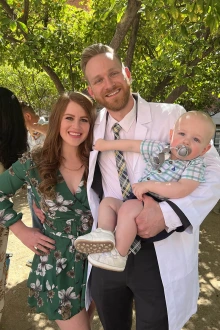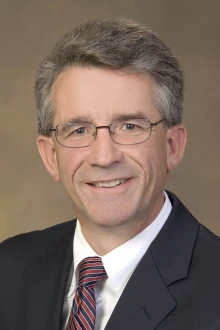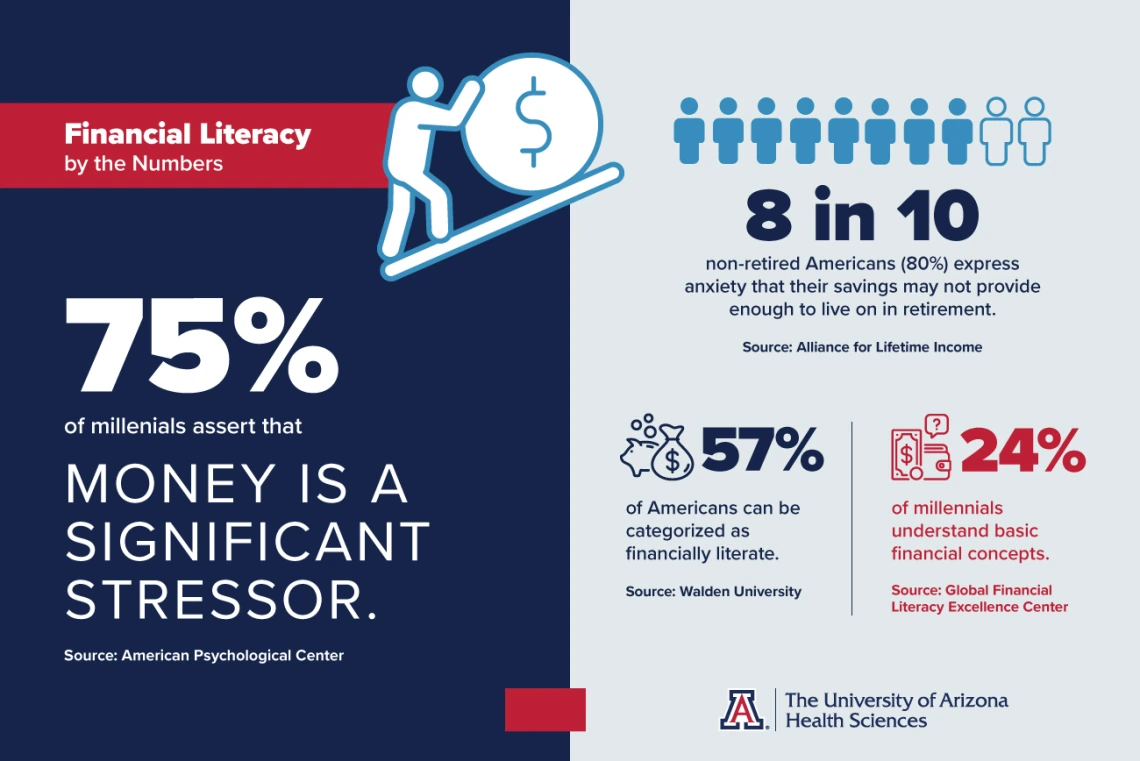Increasing financial literacy for health care professionals
A new course is empowering students with the knowledge to overcome financial challenges they may face while pursuing careers in health care.

University of Arizona Health Sciences students are learning how to reduce the burden of student loan debt while acquiring useful skills to make smart financial decisions that will support a sustained career in the health care workforce.
Christian Suyat had a plan. He was going to earn an undergraduate degree and go on to medical school. Then he would do a residency somewhere and be on his way to a long career as a physician.

Christian Suyat (middle) with his partner, Kelsey, and their 1-year old son, Kellen, at the R. Ken Coit College of Pharmacy White Coat Ceremony.
Fast forward a decade, and things did not go according to Suyat’s plan. When he finished his undergraduate studies at Northern Arizona University, Suyat needed a break from school. He had student loans to pay back, so he went to work at a restaurant and later as a bartender in California.
As time went by, Suyat paid on his loans and made ends meet while thoughts of medical school faded. Yet he longed for more. He wanted a family and a fulfilling career.
At age 27, Suyat left the service industry and went to work at a pharmacy. The new job inspired him to pursue a path more in line with his initial plan – one that included an advanced degree and a career in the health professions. He was concerned, though, about how he was going to make that ambition work financially.
“I still have some of those undergraduate loans,” Suyat said. “If I was coming back to graduate school, it needed to be worth it. I knew I wanted to work through grad school and come out with as little debt as possible.”
Suyat moved back to Arizona, completed his prerequisite coursework and enrolled in the University of Arizona R. Ken Coit College of Pharmacy. Last spring, Suyat took an elective course on financial literacy that, in hindsight, could have saved him significant time and money in his career pursuit.
Only four in seven Americans can be categorized as financially literate.
Source: Walden University
The course “Public Health Practice 438/538: Health Profession Finance” was launched in 2020 as part of a University of Arizona Health Sciences strategic initiative to minimize the debt burden for students by increasing their financial literacy. Offered by the Mel and Enid Zuckerman College of Public Health, the course aims to equip students with the knowledge and skills to manage their finances and make critical decisions such as buying a car, investing, paying off student loans and saving for a child’s college education.
“I thought I knew quite a bit about financial literacy,” Suyat said. “It turned out I knew nothing. I wish I had taken the course 10 years ago. It would have helped me in so many ways.”
Why financial literacy matters

Christian Suyat says he wishes he began saving money and planning for his financial future earlier in life. Now, Suyat is putting to use the skills he learned in a Health Professions Finance course, including opening a 529 plan to begin saving for his son's future college tuition.
Across the nation, there are workforce shortages in nearly every health care profession. Solving the problem is neither a quick nor cheap solution, especially for students who may be taking on student loans to pay for their education. Large debt burdens can add stress to new physicians and other early career health care professionals, some of whom may also be vulnerable to financial missteps.
“It is just as important to take care of yourself and your family as it is being able to take care of patients,” Suyat said. “If we’re suffering, the patients may suffer. I know for me, having this knowledge and understanding, it can remove a lot of my stress and improve my personal and physical health by taking away some of that worry.”
Suyat’s second plan is coming together at age 30. He balances graduate studies with a job at a pharmacy and spending time with his family, including a 1-year old son. One night this spring, his partner noticed him reading a new book; she wondered if he was reading it for leisure or if it was homework.
“It was the Health Profession Finance course book,” Suyat said. “My partner has always been the financially responsible one, so I think she was a little surprised to see me reading it. But I told her about the course, and we talked about some of what I was learning. Even one of the examples in the book was relevant to us because it was a very similar situation to the way she refinanced her mortgage. It gave us something to think about and talk about.”
Equipped to make informed decisions
The book serves as the foundation for the Health Professions Finance course taught by Terry Urbine, PhD, assistant professor in the Zuckerman College of Public Health at UArizona Health Sciences. Dr. Urbine designed the course and welcomed the first cohort of students in the fall of 2020. In the three years since, 77 UArizona Health Sciences students have improved their financial literacy.

Beginning this fall, Terry Urbine, PhD, will teach Health Professions Finance in a new seven-week format. The course is an elective available to all UArizona Health Sciences students through the Mel and Enid Zuckerman College of Public Health.
Dr. Urbine believes it is important to not only show students how to feasibly pay off their debts, but also provide useful information for spending money wisely once they begin making a salary.
“The course doesn't tell you what to do with your money, but it gives you the information to make informed decisions,” Suyat said. “For example, buying a car versus leasing a car. The book doesn’t say never lease a car. Instead, it says what the conditions are to lease a car and breaks down the financial equations that show you the level where it may be better to lease or better to buy a car.”
Dr. Urbine tracks his students’ financial literacy in three ways. The first is a baseline examination of 123 multiple choices patterned after the material taught in the class. The second is an exit examination of the same 123 questions designed to measure improvement over the course of the semester. The third is a set of 16 questions recommended by the Financial Industry Regulatory Authority, or FINRA, as a benchmark of client and advisor literacy.
Most notable, Dr. Urbine said, is that each semester, his students outscored respondents at seven medical schools on the FINRA questions.
“The goal is to ease the burden they might be feeling by giving them the skills that will help them manage the various financial challenges they face to get through school and those that arise once they have a job,” Dr. Urbine said. “The skills they learn should allow them to sustain financial stability throughout their career.”
When Suyat graduates, he intends to pursue a pharmacy residency and eventually work in the pharmaceutical industry as a medical science liaison. In the meantime, he has already applied some of the lessons learned in Dr. Urbine’s class. Halfway through the semester, Suyat opened an educational investment account to begin saving for his son’s future college expenses.
“Personally, I think Dr. Urbine’s course on financial literacy should be taught to every high school or undergraduate student. I really enjoyed the course, and it developed a mindset that is going to help my family and my career.”

Our Experts
Terry Urbine, PhD
Senior Lecturer and Assistant Professor, Mel and Enid Zuckerman College of Public Health
Assistant Professor, Department of Family and Community Medicine, College of Medicine – Tucson
Instructor, Pharmacy Practice and Science, R. Ken Coit College of Pharmacy
Contact
Blair Willis
UArizona Health Sciences
520-419-2979
bmw23@arizona.edu

